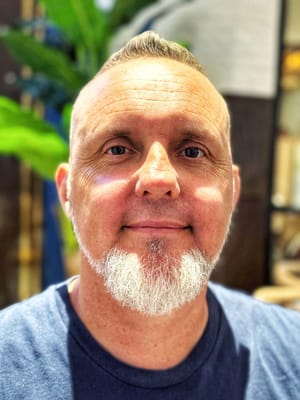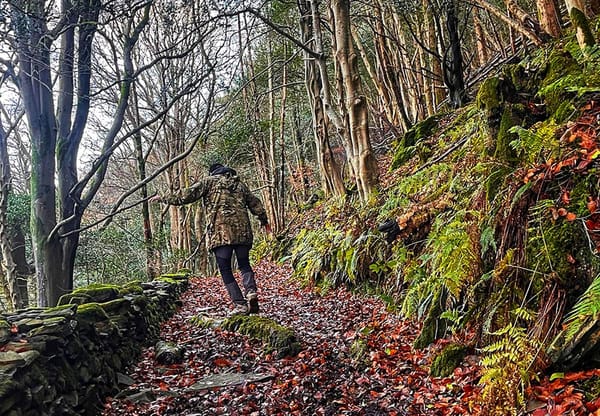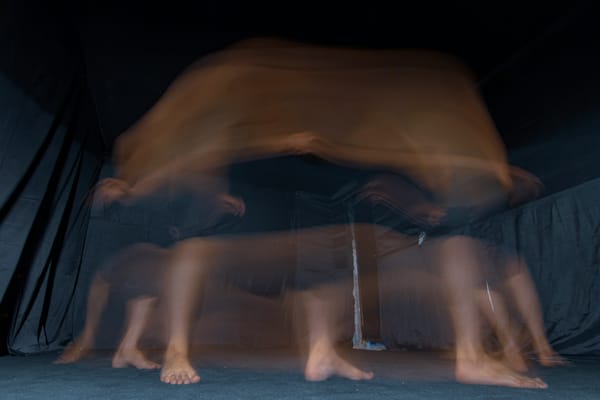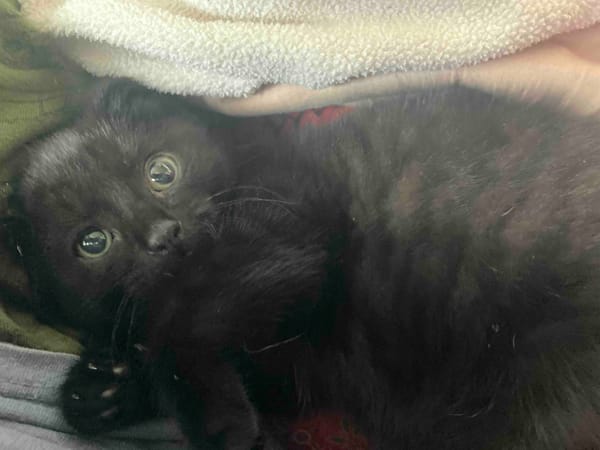I have been thinking a lot lately about 'existential anxiety.' Much of the reason for this is due to discussions I have been having with my two sons. Now, more than ever, as young adults charting a life path, they face the fundamental questions of existence: Who am I really? What gives life meaning? Am I on the right path? These questions, which philosophers have wrestled with for centuries, seem especially pressing in our rapidly changing world where traditional roadmaps no longer provide the certainty they once did.
Their questions reminded me of my journey with existential anxiety—a journey that continues to transform how I understand anxiety, freedom and authenticity. Here's an example. For years, I found myself on the training mat, doing what I had always done—teaching others how to protect themselves. I moved through the familiar rhythms of demonstrating techniques, setting up realistic drills, and preparing students for a self-preservation encounter. From the outside, everything looked normal. But inside, something was changing.
It started as a whisper of unease that grew louder with each session. My heart would race unexpectedly. My thoughts would shift to 'why am I here' mid-demonstration. A strange tightness would grip my chest as I watched students practice the moves I had taught them thousands of times before.
At first, I diagnosed these sensations as simple stress—perhaps burnout from decades of teaching or concerns about the injuries that were increasingly limiting my practice. I pushed through, doing what being a fighter had always taught me to do: overcome, persist, and endure.
But the anxiety didn't subside. It intensified, becoming a constant companion on the mat. Something was trying to speak to me through these physical symptoms, but I couldn't—or wouldn't—hear it. It wasn't until my health collapsed entirely—when doctors delivered the diagnosis of severe cervical degeneration and CTE-like symptoms—that I was forced to take a step back. To listen. To face what 'existential anxiety' had been trying to tell me all along.
As I sat with what I believed at the time to be an unwelcome companion, something unexpected happened. Beneath the discomfort, a message: I had been teaching 'martial arts' as others expected me to, not as I genuinely believed it should be taught. I had been focusing on fight performance when I valued teaching students to take the lessons from the mat to flourish in life. This is what philosophers call 'existential anxiety', which, when properly understood, might help us thrive.
Recognising Existential Anxiety
Most of us have been taught to view the feeling of anxiety as a disorder to treat or, at the very least, an uncomfortable state to manage. Indeed, clinical anxiety disorders deserve proper care and treatment. Some forms of anxiety stem from neurochemical imbalances (although evidence is limited), trauma, or specific phobias, requiring treatment through therapy, medication, or other forms of care.
But what if there is a different kind of anxiety not widely spoken about in day-to-day conversation —one that reveals itself through fundamentally different questions? In other words, how would you know when what you're experiencing is existential anxiety rather than what could be defined as ordinary worry?
In my experience, one can tell the difference based on what questions it asks of you. For instance:
- ‘What's the point of all this?’ – Questions about deeper purpose beyond immediate goals.
- ‘Who am I really?’ – Questions about authentic identity beneath social roles.
- ‘Am I living authentically?’ – Concerns about alignment between actions and deeper values.
- ‘What gives my life meaning?’ – Exploration of what truly matters beyond conventional success.
- ‘Why am I here?’ – Fundamental questions about your place in existence.
These 'philosophically inclined questions' differ profoundly from what I will call ordinary worry. While ordinary worry asks, 'How will I manage this problem?' existential anxiety questions the very framework in which problems exist. Ordinary worry typically diminishes when specific circumstances improve—when the deadline is met, the bill is paid, or the conflict is resolved. Existential anxiety, however, often remains or even intensifies despite ordinary problems being resolved.
Think of it this way:
→ Ordinary worry (problem-focused, circumstantial, diminishes when problems are solved)
→ Existential anxiety (framework-focused, persistent regardless of problem resolution)
In other words, existential anxiety centers on our existence as a whole and cannot be resolved through worldly solutions. It's not about anything particular in our environment but about the very nature of our being.
When I work with coaching clients, I often ask, 'What exactly are you worried about?' After listing immediate concerns like work deadlines and tax returns, there's usually a pause, followed by something like: 'I don't know... everything? Nothing? It's hard to explain.'
That's because existential anxiety isn't pointing to something wrong with the world—it's revealing something true about our existence. ‘Anxiety' then, in this sense, isn't an affliction; it's a fundamental sign of our 'existence' and our relationship with our desire to find meaning, personal responsibility, and the freedom to choose despite life's inherent uncertainty and risks. Without it, we might never question the structures and beliefs that shape our lives; without it, we may never live our best lives.
The Wisdom in Unease
Think about it this way: Most of the time, we live with certain illusions that make life comfortable. We convince ourselves that the meanings inherited from our culture and society are solid and unchanging. We act as if our identities are fixed, stable and unchanging. We behave as if the paths before us are clearly marked. Existential anxiety disrupts these illusions. It's like a crack in a window we didn't even realise we were looking through.
When existential anxiety strikes, it reveals three fundamental truths that we usually prefer to ignore:
We are individuals — Existential anxiety reminds us that we are separate from the social systems and meanings we usually identify with. No matter how connected we are to others, there's a fundamental way in which we face existence alone.
Nothing is certain — Existential anxiety reveals the groundlessness of everything we take for granted. The systems of meaning we rely on—from career paths to relationship models to philosophical frameworks—have no absolute foundation except for the meaning we give them.
We are radically free — Perhaps most unsettling of all, existential anxiety shows us that we are not defined by any fixed identity. We are responsible for creating meaning in a world that offers no preset script.
Kierkegaard described anxiety as 'a sympathetic antipathy and an antipathetic sympathy'—we're simultaneously drawn to and repelled by it. In other words, when existential anxiety strikes, we glimpse both the terror and the wonder of our freedom as human beings.
When Existential Anxiety Speaks
In my case, existential anxiety was trying to tell me something important about authenticity. For decades, I had built my identity around being a martial arts instructor focused on self-preservation effectiveness. This wasn't false—I valued these skills and believed in teaching them well. But it was incomplete. Beneath that identity was a deeper desire to help people flourish as whole human beings. In other words, to use martial arts as a vehicle for transformation rather than just fighting proficiency.
My existential anxiety wasn't a sign that something was wrong with me; it was a sign that I needed to wake up to a more authentic way of being. It was calling me to examine whether the path I had followed—shaped by the contemporary martial arts community's expectations and definitions of success—was indeed a path of my own making and a path I wanted to remain on.
I see this pattern with clients as well. One man—let's call him James—came to me during what appeared to be a classic midlife crisis. He had a successful career, a loving family, and all the trappings of a well-lived life—yet he was consumed by existential anxiety that seemed to have no obvious cause. 'Everyone tells me I should be happy,' he said. 'I have everything I wanted. So why do I feel like I'm standing on the edge of a cliff?'
As we explored his existential anxiety rather than trying to eliminate it, something interesting emerged. His anxiety wasn't a sign that something was wrong; it was a sign that part of him was waking up. It was calling him to examine whether the path he had followed—a path laid out by family expectations and social definitions of success—was truly his own. His existential anxiety wasn't a disorder; it was an invitation to live authentically.
From Avoidance to Engagement
What I've come to understand is that existential anxiety persists largely because we avoid engaging with the questions of existence it raises. Often, societal pressure, conformity, or fear of our own freedom keeps us from genuinely entertaining these questions. The anxiety intensifies not because the questions are unanswerable but because we refuse to engage with them.
Only when my body forced me to stop—when my health collapsed—did I truly listen to what existential anxiety had been trying to tell me all along. It was not a disorder to suppress, but a message demanding attention. Having learned this lesson the hard way, I now recognise that there are ways to engage with existential anxiety before it reaches a crisis point. Because often, existential anxiety left unanswered can become the kind of worry that impacts one's long-term mental health.
While my own journey required a dramatic wake-up call, yours doesn't have to follow the same path. The insights I've gained might help you recognise and work with existential anxiety before it overwhelms you.
So how do we do this? How do we engage with existential anxiety before it reaches a breaking point? I have thought about this a lot, and here are a few things I have found helpful in this endeavour.
- Listen to the message, not just the medium – Existential anxiety often points to where we are living inauthentically or avoiding essential life choices. In my case, it was trying to tell me that my teaching was not aligned with my deeper values. The sooner we listen, the less forcefully existential anxiety has to speak.
- Experience existential anxiety physically – When we ignore existential anxiety, it often manifests in our bodies. Instead of getting lost in mental loops, we can tune into where we feel it—tightness in the chest, restlessness in the limbs, a sinking in the stomach. Sit with it, clear your mind and allow whatever needs to arise to do so. Then, bracket out your judgments as best you can and begin to write down whatever arises. No matter how crazy it might sound. Take time to reflect on what you wrote. This did wonders for me. Until I wrote down what was arising, I found many ways to ignore the message that my body was trying to tell me. Once I wrote it down, I could step back and look at it objectively.
- Embrace the ‘dizziness of freedom’ – Kierkegaard described existential anxiety as the dizziness of recognising our limitless possibilities. Existential anxiety calls for engagement. We cannot eliminate the groundlessness of life, but we can decide how we stand upon it, how we want to show up. For me, this meant transforming my teaching approach, even though it wasn't the popular choice.
Finding an 'Uneasy Comfort'
I still experience existential anxiety. But my relationship with existential anxiety has fundamentally changed. Rather than seeing it only as a discomfort to be eliminated, I recognise it as a signal that I'm awake to the mystery and responsibility of authentic existence.
This ‘uneasy comfort’ represents a middle path—neither denying the existential anxiety nor being overwhelmed by it. It's a state where we acknowledge the unsettling nature of our existence while finding meaning precisely in our capacity to face this reality. It's not the comfortable certainty of following prescribed paths, but the deeper satisfaction of knowing that the uncertainty we feel is a natural response to the actual conditions of human existence.
By engaging with existential anxiety rather than avoiding it, we may prevent it from intensifying into something more debilitating. While I cannot claim that addressing existential anxiety will always prevent ordinary worry or clinical anxiety (as many factors contribute to mental health conditions), in my experience and that of many clients, acknowledging these deeper questions often relieves the pressure that builds when we ignore them. This engagement doesn't just reduce potential distress; it frequently provides clarity regarding the fundamental questions about our existence that prompted the anxiety in the first place.
In our modern culture of quick fixes and pathologised emotions, we need to reclaim existential anxiety—not as a disorder to be cured but as an essential aspect of being fully human. After all, only a being capable of creating meaning in a world without preset instructions would feel the weight of that responsibility as anxiety.
The next time existential anxiety visits you, consider welcoming it—not as a pleasant guest, certainly, but as a messenger carrying news you might need to hear. News about your freedom, your individuality, and your capacity to create meaning in a life where nothing is certain except the responsibility to choose.
Recommendations
If this approach to navigating life's complexities resonates with you, I invite you to explore philosophical coaching through a personal consultation. Together, we can discover how philosophical wisdom might illuminate your specific path forward. [find out more here]










Member discussion